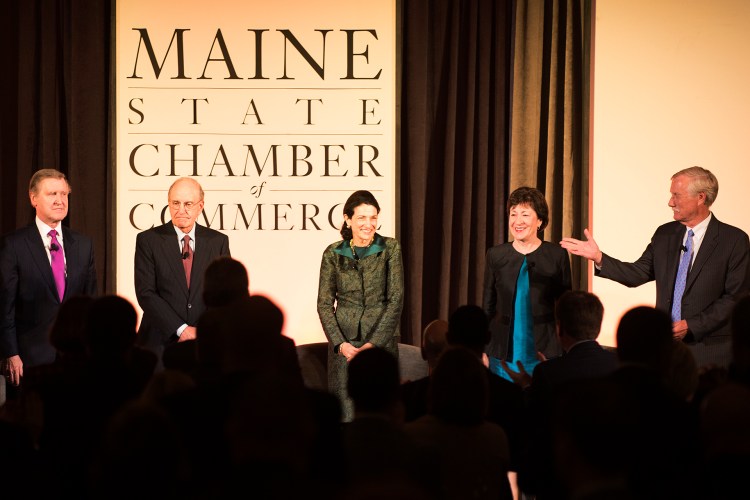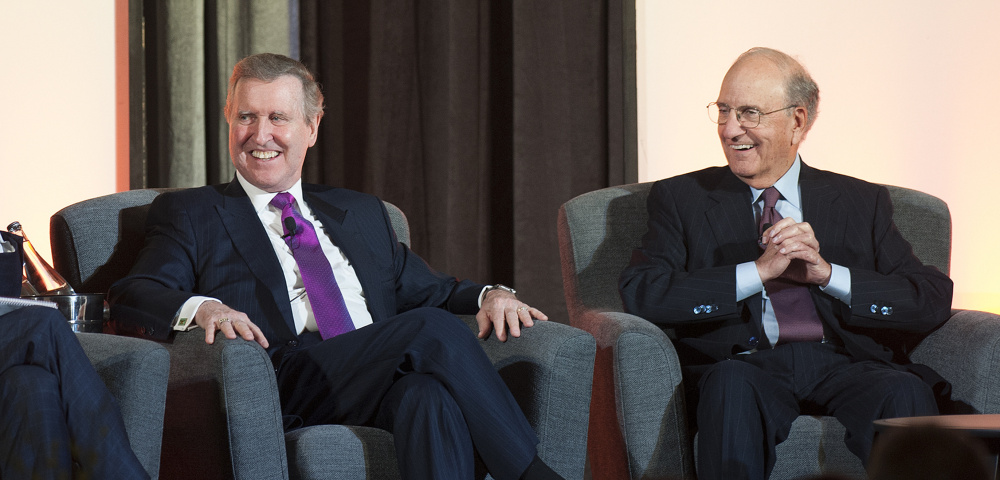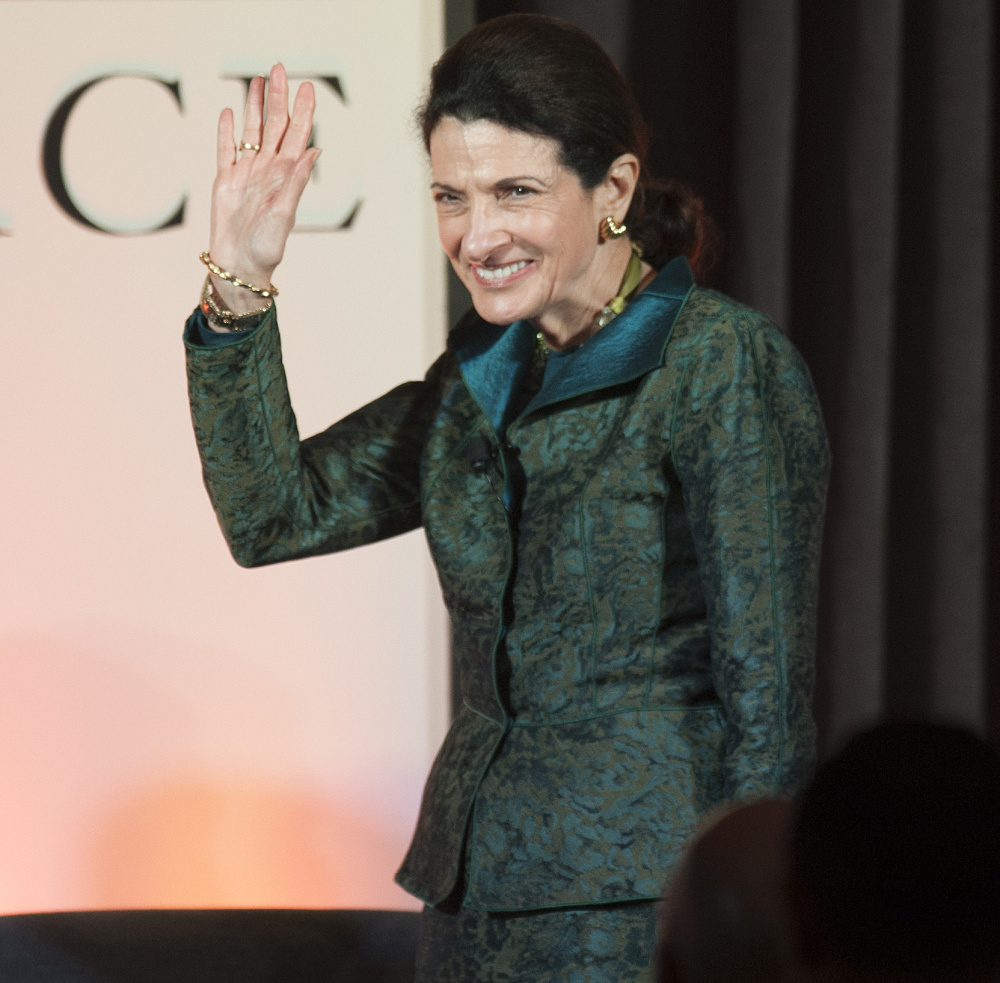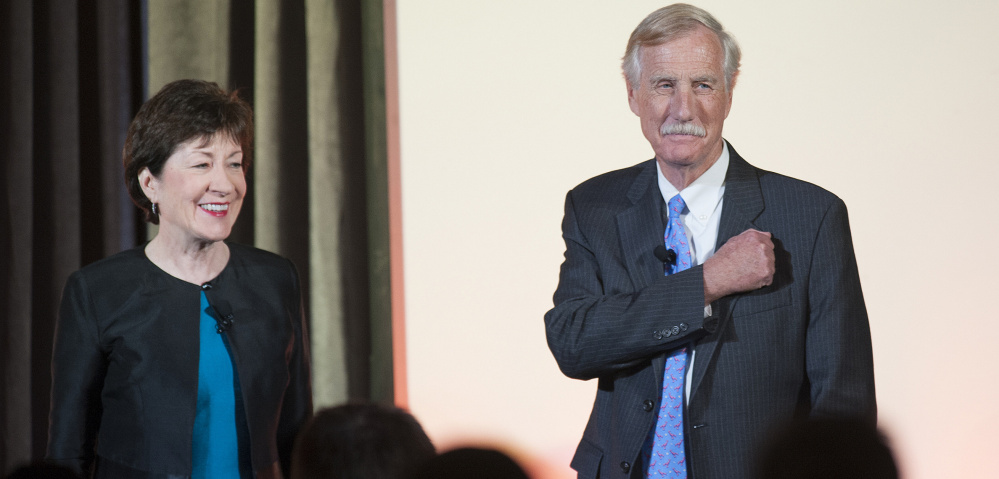BANGOR — In a historic gathering of Maine political firepower, five current and former U.S. senators lamented Friday night the nation’s deep polarization but also expressed optimism – if measured – for eventually moving back toward compromise and cooperation.
Maine’s five living senators – former Sens. William Cohen, George Mitchell and Olympia Snowe and sitting Sens. Susan Collins and Angus King – shared the stage and their thoughts just 11 days before the end of a bitter, bruising presidential campaign that has threatened to upend the political parties.
Cohen didn’t mince words from the start when he predicted that forces of globalization, immigration and the “democratization of information” were changing society in ways that would lead to a breakup, of sorts, of the traditional two parties. Eventually, dysfunction domestically and internationally would force the country back together, but he predicted more fracturing until then.
“I think those three factors are at the heart of what is pulling us apart right now and pulling us to extremes, both in the Republican Party and the Democratic Party,” said Cohen, a Republican who served as defense secretary to Democratic President Bill Clinton.
Several of Cohen’s colleagues agreed that a “revolution” was happening in American politics but offered more optimistic forecasts.
“I really believe that there is an opportunity here,” said Collins, one of the few remaining moderate Republicans in the Senate. “Certainly the forces that have been described make it more difficult for those of us who are in the center … but Angus and I have seen the center work.”
The Maine State Chamber of Commerce event came just hours after Republican Donald Trump brought his controversial, frustration-fueled presidential campaign to a raucous rally in Lisbon. Trump seized on the latest news of FBI inquiries into Democratic nominee Hillary Clinton’s private email server – calling it the “biggest scandal since Watergate” – while hitting his bedrock issues of building a wall along the Mexican border, repealing Obamacare and rewriting trade deals.
The tone of the senatorial panel discussion couldn’t have been more different.
The senators – three Republicans, one Democrat and one independent, all known for their bipartisan approach – praised and joked with one another but also reminisced about a time when Washington politics were more civil, even if the issues were no less contentious.
Snowe, who left the Senate in 2013 because she saw no end to the gridlock and polarization, said the difference was “like night and day.”
“What distinguished us in the past is that we were willing after fierce debates, and many of them were unpleasant … to transcend our differences for the greater good of the country and reach a solution,” Snowe said. “Today it is all about taking it to the next election and scoring political points.”
Turning to Mitchell, moderator John Harwood of CNBC and The New York Times asked whether individual senators could stand up to leadership without fear of being challenged in the primary for going against the party’s political machine.
Mitchell, the former Senate majority leader, said it doesn’t happen as often as it needs to. But he recounted how he and Sen. Bob Dole, the former Republican leader, “disagreed almost every day,” but stuck to the issues and treated each other with respect while attempting to find a solution.
“We knew we each had high responsibility to the senators who elected us … but we also knew that we had a higher loyalty to the people of this country,” said Mitchell, who went on to become an international peace negotiator after leaving the Senate. “And I think what we are seeing now is a distortion of values in terms of loyalties where increasingly now it is to the parties.”
King, who is in his first term in the Senate but served eight years as Maine governor, described the current concept among some that “compromise” is a bad word as “one of the most pernicious developments” of his political career. But like Collins, with whom he often works on state and national issues, the independent – who caucuses with the Democrats – said he sees a willingness to change, at least in the Senate.
“I’ve had a lot of colleagues in the past couple of months say, ‘We’re sick of this and in the next Congress we’re going to find a better way,’ ” King said. “And there are probably 20, 25 easily from both sides that want to do that. And that is where we have to start.”
All five senators said that part of the problem is the fractured, 24-hour media landscape that allows Americans to exclusively hear news slanted toward their own political views.
Collins, meanwhile, called on more Americans to get involved in the primaries to counter the current dominance of the more politically ideological ends of both parties.
“I believe that the center in America needs to wake up and be more active and not leave the political decisions to the extremes,” Collins said.
Of course, the night was not all political gloom.
Snowe recounted how President Obama urged her to become the next Joan of Arc by voting with Democrats to support the Affordable Care Act, to which Snowe reminded Obama that the saint was burned at the stake. Cohen and Mitchell, who held senior positions in their respective parties while serving together, traded jests with each other about seniority and who was entitled to the last word.
But Harwood summed up the more than 75-minute discussion with a wish.
“I’m not from Maine, but I would offer my wish as a citizen, and that is: more of what we’ve seen on this platform tonight and less of what we’ve been getting,” Harwood said.
Send questions/comments to the editors.






